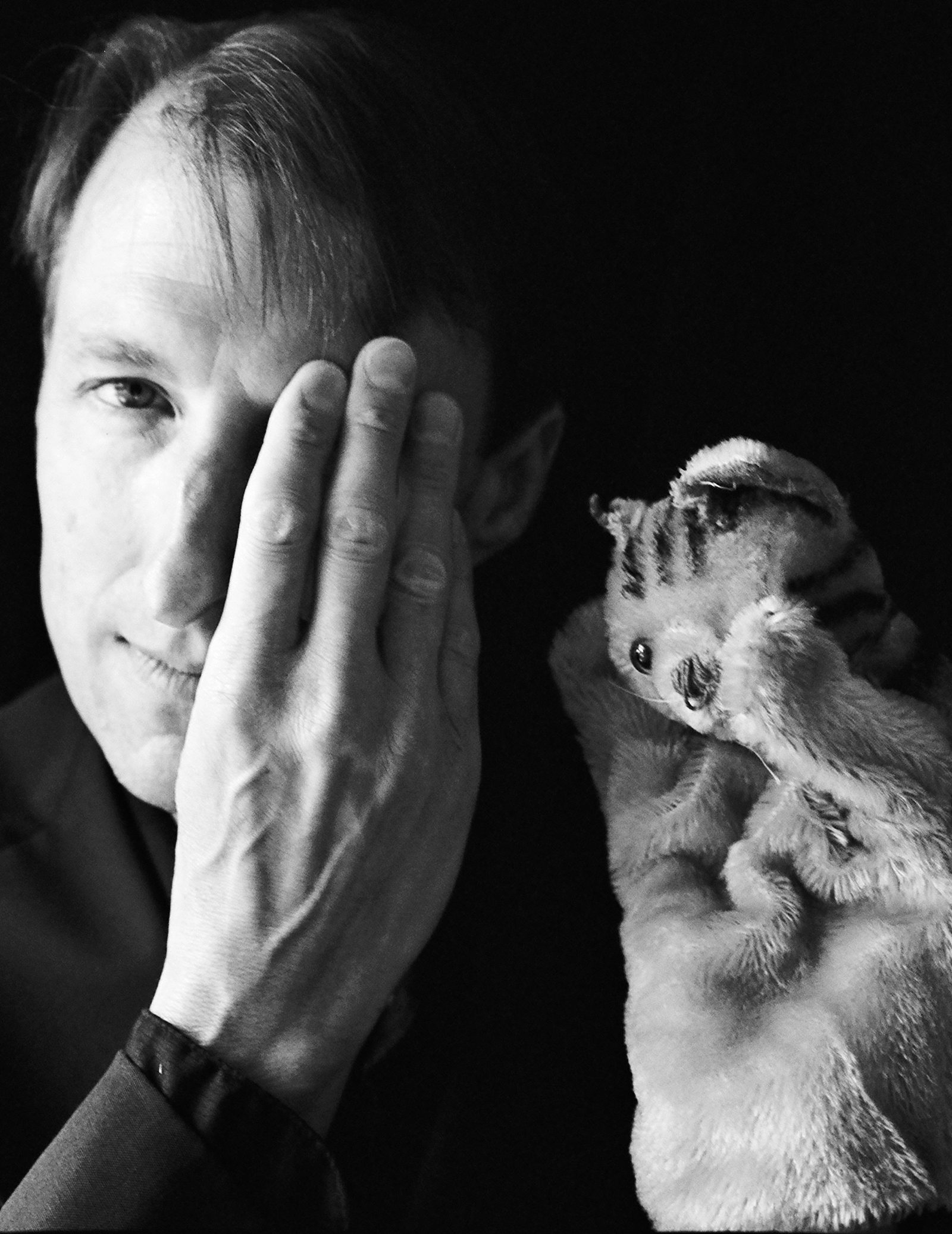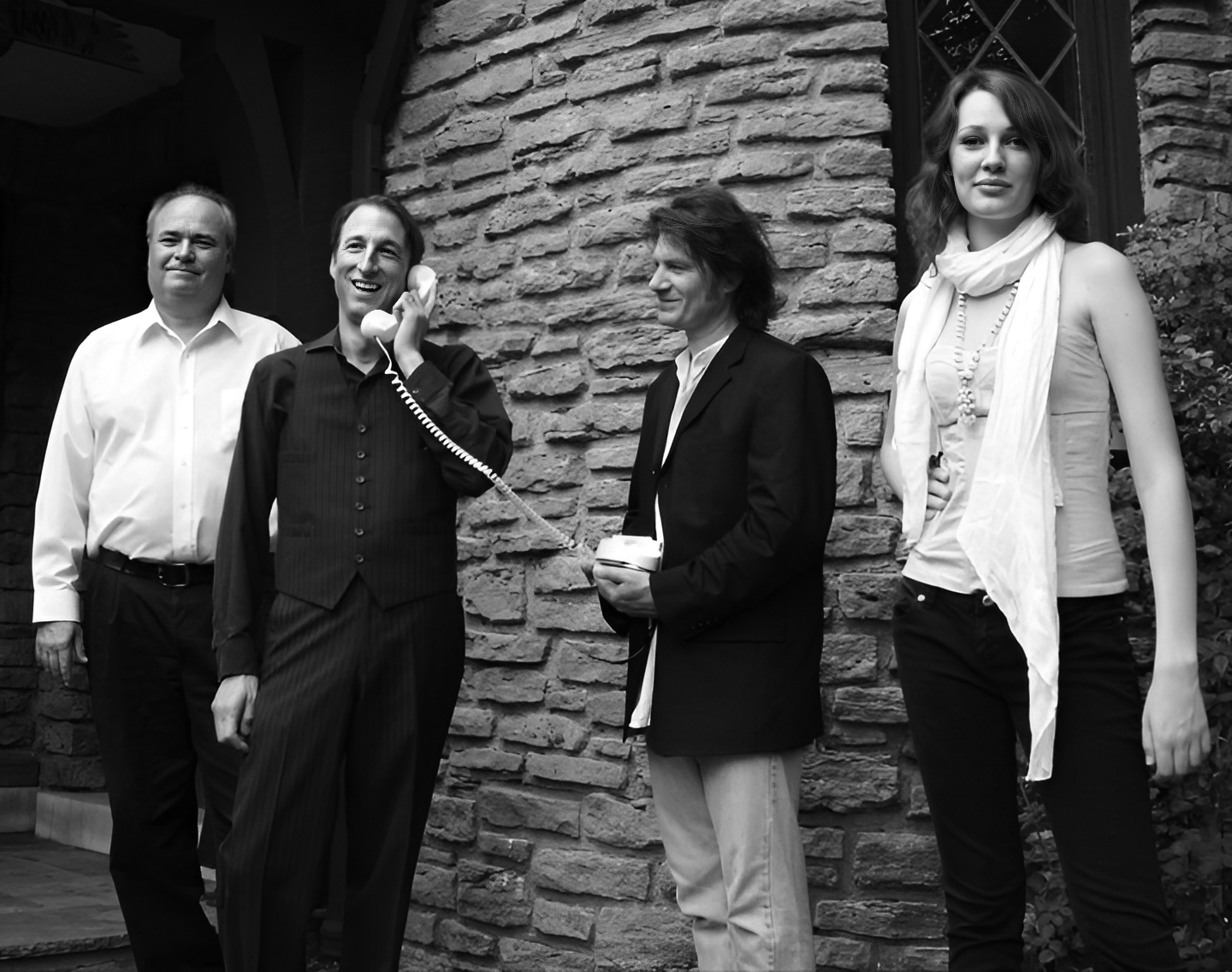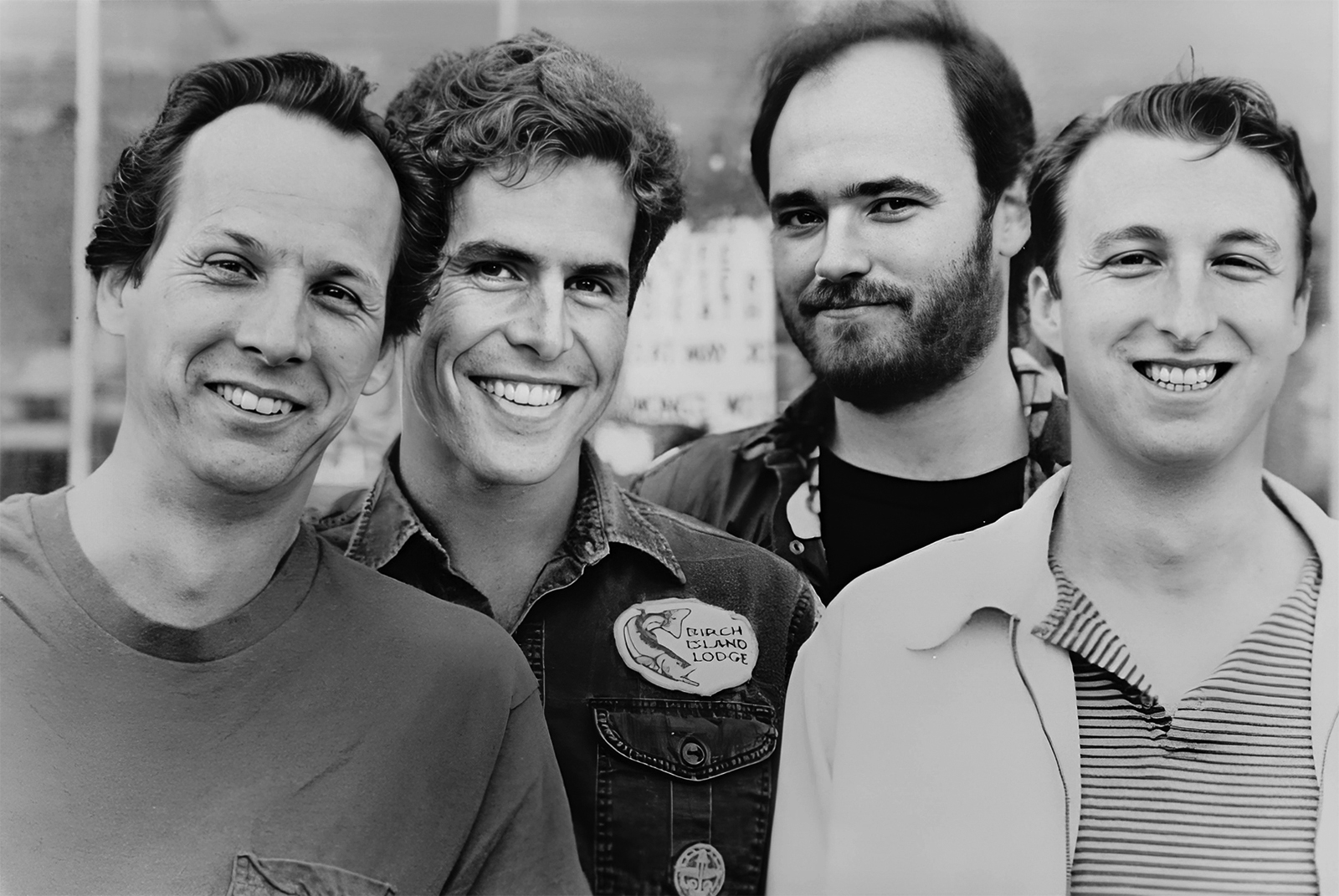
Donate to Innerviews
Since 1994, Innerviews has provided uncompromising, in-depth interviews with musicians across every genre imaginable. And it does that with no trackers, cookies, clickbait, or advertising.
Your donations are welcome to help continue its mission of highlighting incredible music and artists, without any commercial considerations.
Your contributions will be instantly transformed into stories and videos, and cover hosting and web management costs. Importantly, your dollars will help ensure Innerviews remains absolutely free to all visitors, independent of their ability to financially support it.
Please consider making a donation today by using the PayPal QR code below.

Chris Arduser
Lush Angularity
by Anil Prasad
Copyright © 2008 Anil Prasad.
 Photo: Michael Wilson
Photo: Michael Wilson
Chris Arduser’s dedication to the art of songcraft has propelled an impressive career that’s captured the imagination of listeners near and far from his Cincinnati, Ohio base. The multi-talented musician, known as a singer-songwriter, drummer, guitarist, and mandolinist, has contributed to some of the most interesting and intriguing rock acts to emerge since the ‘80s.
A significant chunk of Arduser’s career has been spent as the drummer and a singer-songwriter for The Bears and Psychodots, two highly influential Cincinnati bands. The groups have shared line-ups featuring combinations of Arduser, guitarists/vocalists Rob Fetters and Adrian Belew, and bassist Bob Nyswonger. Both acts are local legends, as well as renowned nationally for their eclectic, intelligent pop songs full of gorgeous harmonies, inventive lyrics, and superb musicianship. The Bears were active in the late ‘80s, with two albums to their credit before breaking up in 1989. They later reemerged in early 2001 with two more studio albums, and a live CD and DVD before going on hiatus in 2007. Psychodots, with four CDs to its name, continues as a part-time entity with a new release due later this year.
From 1998 to 2000, Arduser also co-led The Graveblankets, an engaging folk-rock act featuring guitarist George Cunningham and violinist/vocalist Bridgett Otto. The group released five albums before Arduser chose to focus on a solo career that kicked off with 2002’s Hostage and 2005’s The Celebrity Motorcade. Both are solo efforts in the truest sense with Arduser playing every instrument. The Celebrity Motorcade could be considered a concept album in that it serves as a salute to the lives and lifestyles of 1920’s Hollywood silent film stars and directors. Hostage is a fun collection of effusive pop tracks that explore Arduser’s twisted takes on the dilemmas and obsessions of modern life, as well as dysfunctional relationships and the pandemonium they often cause.
The latter topic has proven to be particularly fertile soil for Arduser. It resonates even more strongly on his new solo CD Hapless, which is entirely dedicated to those engaged in contemporary courtship mayhem. The album features high-octane production and arrangements that serve as the backdrop for Arduser’s sarcasm-laden, dark humor-laced songs. And unlike the solo approach of the first two albums under his name, Hapless features several guest contributions from Fetters, Nyswonger, Otto, and Cunningham, as well as vocalist Laura Chenault and bassist Don Aren. In addition, the CD includes Arduser’s best vocal takes to date, with several soaring performances that find him pushing his boundaries to terrific effect. All told, Hapless is a truly addictive collection that has to be a contender for best pop album of the year.
Hapless seems to focus on the follies inherent in the pursuit and decay of intimate connections. What made you choose that as a theme for the whole record?
Write what you know, right? I’ve led a somewhat bawdy, tumultuous life. I attempted Keith Moon impersonations at 11, smoked my first joint at 12, took acid and got arrested at 14, fell in love and lust at 15, quit high school to go on the road with a rock and roll band at 17, met Frank Zappa and was jailed briefly at 18. I’ve seen my share of romantic war and peace across the years. Also, I love black comedy and gallows humor. I always write about dysfunction. It was easy.
The record began innocently enough. I had several tunes floating around that either needed to be finished or discarded, so I gave them to engineer and producer Matt Hueneman with no input other than “Make ‘em sound good please.” Matt and I logged hundreds of hours of sessions over the years and I respect and trust him. Usually I tend to micro-manage the mix process, but I was burned out with these tunes, having lived with them for years knowing the myriad mixes I had were not correct. The first was “Paid for the Privilege” which is a murder ballad hiding inside a sing-songy pop number. I loved the results but realized I’d never recorded a particular counter-melody that would complete the tune. Once that happened, courtesy of George Cunningham’s slide guitar, the process was established. We kept dumping tunes into Matt’s computer and figuring out what else, if anything, was needed. A couple of songs didn’t make the cut. I think they’re still valid, but the recordings were unworkable. Eventually I found the thematic thread and wrote a few new tunes to complement the existing material. Another thing I should mention is that a song called “Hapless” really started the whole thing, but it never got recorded. Maybe next time.
 Photo: Michael Wilson
Photo: Michael Wilson
The album finds you taking major leaps forward in terms of pushing your vocal range and sustain, particularly on “Mid Air.” Describe the work you put into expanding your vocal possibilities.
Tracking a vocal is always the last thing I do. The songs were recorded over a 10-year period, so I can’t point to any change of approach regarding my singing. I know that on “Mid Air” I was hoping to capture a certain in-the-moment desperation that the narrator of the song was experiencing. The performance was recorded at musician and producer Brian Lovely’s studio and I’m sure he helped me get something extra going.
I understand you're a big fan of Phil Spector's “Wall of Sound” approach. Describe how those principles informed the sound of Hapless.
I dig lushness. Also, I dig angularity. I’m always trying to combine these opposites. Phil Spector’s approach has been quite an inspiration, including The Ronettes “Be My Baby” and Ike and Tina’s “River Deep, Mountain High.” Early 20th century music is also an influence, especially Stravinsky’s suites for small orchestra and Erik Satie’s piano pieces.
Did you do anything special while making the album that an audio nerd might find interesting?
Laura Chenault’s wordless vocals at the beginning of “Everything” were originally some not very featured “Ooohs” and “Ahhhs” in the bridge. Matt Hueneman had put a very nice swirling effect on them and as soon as I heard it I knew what had to be done. A little cutting and pasting and voila! Ah, the wonders of ProTools. “Poor Suzette” needed a guitar solo at the end and by sheer chance Rob Fetters had dropped by the studio I was going to that day. I said “You wanna play some guitar?” to which he replied “What key is it in?” and off we went. Rob did about five passes and it was all over in 15 minutes or so. Later, during mixing, I realized we could edit together a couple of little figures of his that would work perfectly in the earlier choruses. Once again, without ProTools this probably wouldn’t have happened or would have taken a day or two instead of 20 minutes. We also left in my Neil Young-ish one note flailing at the very end creating the frenzy most likely heard inside the head of a hopelessly intoxicated human.
Describe the creative process behind the songs on Hapless.
I’ve been seriously writing songs for 20-some years and I think I use the same process: create a sound that reminds you of something you love—whether that’s another song or a girl or a sound or a body of water or something else. The three-minute pop song changed my life when I was five years old. I still believe in that power, misguided as I may be. I’m always working on something. Mostly musical ideas come first, but I have written entire songs driving 70 miles-an-hour in my car. An example is “The General Died at Dawn” on The Graveblankets’ Western Medicine.
Whatever I’m reading or thinking about that day starts the machinery. I spit out a first draft and sometimes find very little fault, but mostly I slowly change a word here or there until it can be sung in front of someone without shame. An extreme example is “Hangman’s Knot” which used to be called “Peace.” The lyric was an unabashed plea for global understanding. All of the instruments were tracked, notably a killer upright bass performance from Don Aren. Only the vocal remained and as I sang a first take I instantly felt “This is pure bullshit.” Much as I am a complete peacenik and eschew violence as an agent of change, I knew the lyric and melody sucked. So, I went home, made a cup of espresso, sat down with my guitar and decided to write yet another treatise on life and death.
What tend to be the biggest musical challenges you face in your creative process?
Even if you’re sure the song is good, is it in the right key for my voice? Is the tempo correct? Is the bridge even necessary? Should the song be in 4/4 or 3/4? Those are the questions I tend to ask. However, I find that if I step back a bit, maybe just a day or two, I can listen like it’s someone else’s tune and be very critical.
How have you evolved as a singer-songwriter across your three solo albums?
I can’t honestly say because the songs on Hapless were written across 10 years. Half of them were written before either of my first two solo discs. If anything, I think my studio savvy has increased. I do a lot of sessions for other producers and must have picked up some secrets over time. Perhaps an evolution occurred after The Graveblankets disbanded. It was then that I decided to make solo discs that revolved around a simple idea. You might call them “concept albums,” but it isn’t 1973 anymore.
At what point in your career did you take up guitar?
I started playing drums in 1970 and my brother John got a Gibson hollow body electric guitar shortly thereafter. We had an instant band. I asked him to show me the chords he knew. He didn’t resist. I use the guitar as one of my writing and arranging tools, with the others being piano and mandolin. I don’t aspire to be a soloist or virtuoso. When a tune requires a guitar approach I’m incapable of, I call George Cunningham, Rob Fetters, or any of the other myriad great guitarists I know.
 The Graveblankets: Bob Nyswonger, Chris Arduser, George Cunningham, and Rosie Carson | Photo: Michael Wilson
The Graveblankets: Bob Nyswonger, Chris Arduser, George Cunningham, and Rosie Carson | Photo: Michael Wilson
The Graveblankets represent a major chunk of your musical career to date. Describe the seeds of the group and why it eventually folded.
The Bears’ second LP Rise and Shine featured a song of mine called “Little Blue River.” People seemed to really dig it. Rolling Stone said it was the best tune on our record. I suppose this outside validation opened some floodgate and I started writing like mad. After The Bears first broke up in 1988, Rob Fetters, Bob Nyswonger, and I decided to stay together and Psychodots began. Since all of us are writers, there was no way my burgeoning catalog of songs could be addressed. Also, I had a different sound in my head: a bluegrass band playing existential pop songs. That’s why and when The Graveblankets were formed. It was the first band I led. When it emerged in 1988, we were a folksy trio with myself on mandolin and vocals, George Cunningham on guitar and vocals, and Bridget Otto singing and wearing some nice boots. It was a reaction to the endless loud rocking that I’d been doing since 1970. I wanted to make an organic wooden sound that would be countered by dark, occasionally confrontational lyrics. I suppose the main inspirations were Bob Dylan, Pete Townshend’s acoustic persona most aptly expressed on the Who Came First LP, Bruce Cockburn, and Richard Thompson.
The Graveblankets carried on for some years getting a lot of attention and airplay in the Cincinnati area. Our early recordings, many of which featured me as a one-man band, were cassette tapes played on the radio by enthusiastic disc jockeys. Bill Lloyd, who is an excellent singer-songwriter and producer, was at that time a talent scout for RCA in Nashville and really dug our thing. He did his best to get somebody interested but nothing happened. All of this got me thinking about mainstream possibilities. It was the mid-‘90s and through my friend Mike Radovsky I got involved with a Nashville label called I.V. Records. All I really wanted was to record a batch of my tunes in a great studio with a great engineer and if I got a record deal that’d be great as well. The I.V. folks were really cool. They bought me a little home studio, gave me a publishing deal for a short while that resulted in an influx of cash, paid for gas and lodging, and got us a few showcase gigs in Nashville. By the time we finished the record, the record industry was beginning its downslide. The labels wanted bands that essentially didn’t need a label because they were doing so well on their own like The Dave Matthews band. I couldn’t devote my entire life to The Graveblankets as I earned my living playing gigs and sessions for various groups and producers in Cincinnati. But, like I said, I got the record I wanted—our fourth, called Where It Hurts.
By the year 2000, I had been at it for a decade and was seriously burned out. It was too much effort for not enough reward. After a gig that was not well attended I decided to no longer pursue that particular dream. The Bears were about to be reactivated with the release of Car Caught Fire and subsequent touring. I decided to make a solo disc to sell while on the road. It was a good idea and that album Hostage did well and got lots of positive press.
What is the current status of The Bears?
It’s truly impossible to predict what will happen with The Bears. I never thought we’d make a third record much less tour, do a live DVD and record, and then a fourth studio album. As proud as we all were of Eureka, our differing schedules could not embrace long stretches of touring. Right now we’re officially inactive. However, as Fats Waller often said: “One never knows, does one?”
How do you look back on the output of The Bears’ second coming versus its first time around?
The two eras are unique in several ways. Sonically for one. We were using tape way back when of course. And the ‘80s version of the band found me as a callow youth soaking everything in, trying to learn as much as I could from our famous leader and every crazed situation I found myself in. Touring constantly for three years or so gave me enormous fodder for songwriting. By the time we reconvened, I’d spent considerable time in the studio either producing myself or doing all manner of sessions for different artists. I’d also written some songs that turned out to be perfect for the band. The ‘80s band was trying to compete in the mainstream marketplace in terms of thinking about particular songs being singles, music video production and budgets, a “look” that might be singular, etcetera. Later on we just set about recording a cool batch of tunes.
 The Bears, 1987: Adrian Belew, Rob Fetters, Bob Nyswonger, and Chris Arduser | Photo: Primitive Man Recording Co.
The Bears, 1987: Adrian Belew, Rob Fetters, Bob Nyswonger, and Chris Arduser | Photo: Primitive Man Recording Co.
Both Psychodots and The Graveblankets were courted by major labels and management companies, yet neither act ultimately made headway into the national music business spotlight. What were some of the opportunities you faced and why didn't they work out?
The ‘Dots played a showcase-type gig for an Epic Records A&R guy. After rocking our asses off for over an hour, we went directly from stage to meet said person of power. When I shook his hand he said “Ewww, gross! You’re all sweaty!” This mindset is just a tiny example of a certain brand of stupidity one meets in the music industry. The guy gave us a bunch of money to record demos which we promptly did. Of course, nothing came of it. I honestly think the best thing that happened to both bands was making records on our own without label interference. Love it or hate it, we weren’t trying to be anything but ourselves.
What were the lessons you took away from those experiences?
Never take anything for granted. Always be glad you have a gig. At 19 I thought I was over the hill—too old to be a “star.” Then I had an epiphany: I’ll always be happy if I can just keep playing no matter what the situation is.
Will Psychodots reemerge with a new studio project?
All of my projects have to be shared with one another. It’s how a journeyman musician like myself can stay afloat just playing music. That said, the ‘Dots do plan on recording an album of new tunes in the next year or so and we continue playing gigs at a measured pace.
The Cincinnati music scene is a self-contained universe that many people outside of its geographic limits have little familiarity with. Describe what makes it special to you and what keeps you glued to it.
Every week I get to play and work with phenomenal musicians and it’s never the same week to week. There’s a really cool batch of players here and we all can play different styles, appropriate to the gig. I’d be a damn fool if I didn’t appreciate this scene.
What advice do you have for aspiring musicians on how to stay motivated in the choppy waters of today's music business?
The world has changed so much since I first started in 1970 that it’s mind boggling. I played a gig the other day and while we were tearing down, a young woman in her early-to-mid 20's said how “awesome” we were and that she’d never seen a live band before—only DJs and hip-hop artists with taped backing. That such a thing is possible never occurred to me. I guess I’d say to youngsters: don’t be afraid of music from a previous generation or two. You might hear something really cool. I remember my dad turning me on to Gene Krupa when I was going on and on about Keith Moon. He was absolutely right—without Krupa you got no Moon. Also, learn your craft, whether it’s playing a particular instrument or songwriting. Although it may seem hip to not actually know what you’re doing, eventually you’ll reach a dead-end and having certain skills will help you out of it.
Your well-known nickname is “Deathy.” Describe the interest you have in mortality and how it influences your life.
When I was 11 or 12, a good friend of mine died unexpectedly. She was a bright tomboy who used to sit outside my house and listened while I practiced drumming. Hell, I played spin-the-bottle with her. Her family decided on an open casket at the service and while I was filing by to view the corpse and pay last respects I had an out of body experience. I was up above watching all of us looking at the husk of this girl we dug. My guess is it all started there. What I took from the steady stream of deaths in my family and group of friends is that if you feel strongly about something, don’t sit on your ass. Do it. Now. Whether it’s quitting high school to join a rock and roll band or quitting the rock band to get a G.E.D and go to college or fixing a vodka and ice.
How do those thoughts tint your songwriting?
When I began seriously writing it never occurred to me not to write about whatever the hell I wanted. My audience was myself. When a friend said “Gee, that’s really pretty but the lyric is so depressing,” I knew I was on the right track.
Is there a spiritual component to this stuff for you?
I feel it’s better to look at something like death square in the face. However, I’ve come to hate and avoid hospitals. Spiritually speaking, I’m a believer, but any and all organized religion is probably the single most divisive element in our world. My cultural orientation is Western Judeo-Christian-ness, but I think anyone trying to attain Godliness without trying to destroy someone or something else is on the right path.